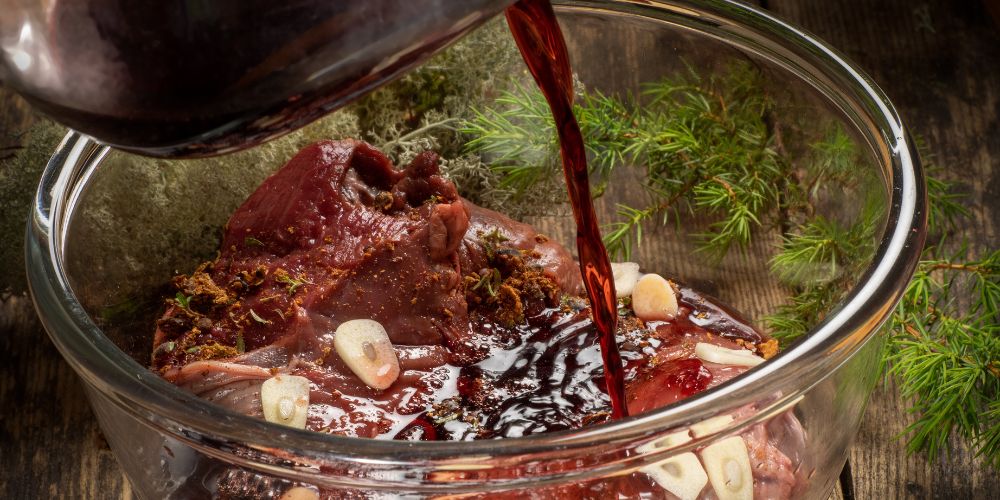- Home
- Blog
- Flavorful and Spicy Seasonings
- How to Marinate Meat for Your Restaurant? Learn 5 Easy Marinating Techniques
How to Marinate Meat for Your Restaurant? Learn 5 Easy Marinating Techniques

Why Marinate?
Marination doesn’t just season meat—it tenderizes, locks in moisture, and enhances the overall mouthfeel. Below are 5 chef-approved techniques to make sure your marinated meats hit the mark every time.
1. Cut Meat into Smaller Pieces
Smaller cuts = more surface area = faster and deeper flavor absorption.
Whether it’s chicken bites or thin pork slices, prepping meat into smaller pieces before marinating helps reduce wait time and guarantees a more even flavor. If you're buying in bulk, consider sourcing pre-cut meats from your supplier to save time.
2. Tenderize With the Back of a Knife
A classic move before pan-searing pork chops or tenderloins: give the meat a few light smacks with the back of a chef’s knife. This loosens up the muscle fibers, making the final dish softer and juicier.
Unlike meat mallets, this method won’t flatten or tear the cut—ideal for restaurants that serve thicker, juicy cuts with a satisfying bite.
3. Use a Fork to Puncture the Meat
For meats with skin (like boneless chicken thighs with skin on), poke small holes with a fork before marinating. This lets seasoning reach both skin and meat more effectively.
Pro tip: Don’t overdo the puncturing. Too many holes may damage the texture and make the meat fall apart during cooking.
4. Vacuum Seal or Use Airtight Bags
Using a sealed bag removes excess air, helping the marinade cling tightly to the surface and penetrate deeper. Vacuum sealing is particularly effective for speed marinating in busy kitchens.
5. Choose the Right Marinade Components
Different ingredients serve different purposes:
👉 To Remove Odor:
Use chili powder, pepper, onion, garlic, wine, or thyme
Frozen meat, when thawed, may release nitrogen compounds that cause off-odors. These ingredients help neutralize smells while adding a flavorful punch.
👉 To Lock in Juiciness:
Use salt, sugar, and oil
Salt boosts water retention in proteins. Sugar slows down coagulation. Oil (especially olive oil) creates a seal on the surface—perfect for grilled or pan-seared items.
👉 To Tenderize:
Use acidic ingredients like vinegar, lemon juice, wine, orange juice, tomato juice, or beer
Acids break down protein structure and soften tough cuts. Bonus: They also cut through fatty flavors and add brightness.
📖 Further Reading: How to Choose the Right Aromatics for Your Marinade →
3 Marination Mistakes to Avoid
❄️ 1. Marinating Frozen Meat
Always defrost meat completely before marinating. If you marinate frozen meat, the released moisture will dilute your marinade, resulting in a weaker flavor.
Also, avoid refreezing marinated meat—it degrades both flavor and texture.
⏱️ 2. Miscalculating Marination Time
Different proteins absorb flavor at different rates. Here are general guidelines:
-
Fish: 10–30 mins depending on firmness (e.g., 10 mins for tilapia, 30 for salmon)
-
Chicken: 2–6 hours (skin-on chicken needs more time)
-
Beef/Pork: 4–8 hours (cut smaller pieces to reduce to 30–40 mins)
⚠️ Don’t over-marinate. Acidic marinades can toughen meat over time if soaked too long.
🚫 3. Reusing Marinades
For food safety, never reuse marinades that have touched raw meat. Bacteria can multiply quickly. If you need extra marinade for dipping or finishing, set some aside before marinating—or order pre-mixed sauces from a certified supplier.
2 Easy Marination Methods
🖐️ Hand Marination
The go-to method for small batches. Use gloves if preferred and massage the marinade into the meat. This also helps tenderize during the process.
⚙️ Commercial Meat Tumblers
For high-volume kitchens, marination machines are a must. Load in meat and marinade, and let the machine do the work. It’s faster, safer, and reduces repetitive strain injuries for staff.

